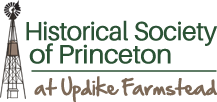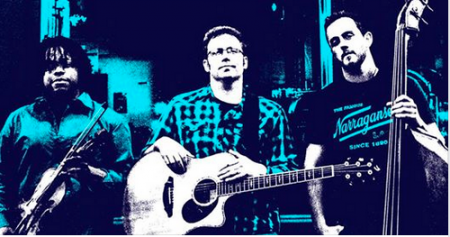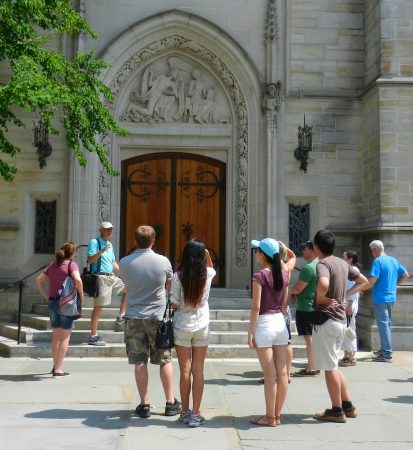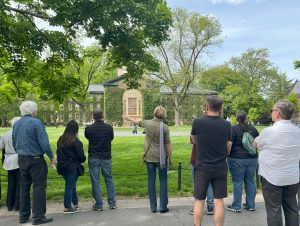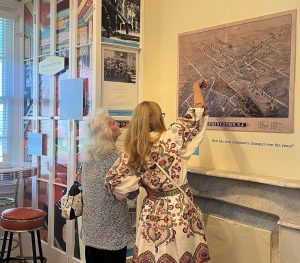The Historical Society of Princeton is pleased to present its 18th annual House Tour from 10 AM to 4 PM on Saturday, November 2, 2019. This signature fall event celebrates significant architecture and design in the homes of HSP’s supportive community. This year’s Tour features six unique homes, each one a distinct example of its own time and style. Visitors will marvel in the modifications, redesigns, furnishings, salvaged materials, and architectural features during a self-guided tour of the homes throughout the day.
This year’s Tour will feature:
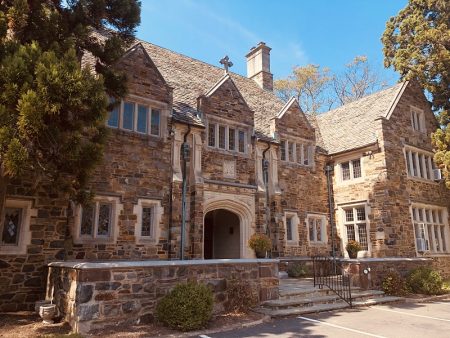 Manor House at Princeton Academy of the Sacred Heart (pictured): Perhaps one of the most intricate homes designed by prolific Princeton architect, Rolf Bauhan, the Manor House was constructed for Mr. and Mrs. Thomas S. Dignan and completed around 1930. Mrs. Dignan’s family owned the Ward Baking Company, makers of Wonder Bread. Bauhan’s largest residential project, Manor House showcases his characteristic attention to detail, from stained glass representing Arthurian legends to complex plasterwork, carved wood detail, and decorative copper downspouts. The original 1930s kitchen, with antique dishwasher, remains preserved. Manor House’s expansive grounds retain a walled garden with stone gazebos and a groundskeeper’s cottage.
Manor House at Princeton Academy of the Sacred Heart (pictured): Perhaps one of the most intricate homes designed by prolific Princeton architect, Rolf Bauhan, the Manor House was constructed for Mr. and Mrs. Thomas S. Dignan and completed around 1930. Mrs. Dignan’s family owned the Ward Baking Company, makers of Wonder Bread. Bauhan’s largest residential project, Manor House showcases his characteristic attention to detail, from stained glass representing Arthurian legends to complex plasterwork, carved wood detail, and decorative copper downspouts. The original 1930s kitchen, with antique dishwasher, remains preserved. Manor House’s expansive grounds retain a walled garden with stone gazebos and a groundskeeper’s cottage.
56 Balcort Drive: This imaginative renovation extended what was once a 1,600-square-foot pattern-book house, built in the 1930s by a carpenter for the Matthews Construction Company, into a sizable modern home respectful of the original’s Dutch Colonial style. Original features of the cottage, such as fireplaces, a staircase, and cabinetry, dot the expanded home, with pre-war fixtures and other salvaged antiques added throughout. The rare tiger maple and typhoon green granite kitchen was featured in the Wall Street Journal. A nature walk winds under large American Elms through the thoughtfully landscaped grounds.
211 Winant Road: This stunning Tudor Revival home was constructed for Moses Taylor Pyne’s mother, Albertina. Pyne, a noted philanthropist and owner of Drumthwacket, engaged his favored architect, Raleigh Gildersleeve, to design the house, which was completed around 1900. In the century that followed, the grand home fell into disrepair. The current owners completed a top-to-bottom renovation by architect David Abelow, a protégé of I.M. Pei, opening up the structure to give the home an urban, loft-like feel while still retaining the appropriate grandeur. The original brick walls and Carnegie steel beams are exposed and juxtaposed with formal plasterwork. A striking three-story glass and metal main stair illuminates the space. Extraordinary attention-to-detail distinguishes this mansion’s not-to-be-missed rescue story.
6 Highland Road: This modern house serves as the design laboratory of interior designer Katie Eastridge. The house forms part of the unique Province Hill neighborhood, which was developed by Richard Dickson and designed by Short and Ford in the late 1970’s with empty nesters in mind. The original home, which features a dramatic central fireplace and tall angled ceilings, has been completely reimagined by Katie Eastridge in her signature exuberant style. The highly edited interior blends Katie’s personal collections (some from her childhood home) with her own furniture design and rare, authentic specimens of mid-century modern design.
29 Cleveland Lane: This classic Tudor-style home was one of the earliest residences on Cleveland Lane, a street carved out of the former Morven Tract enclave. The home recently enjoyed a top-to-bottom renovation by Baxter Construction, installing a gleaming new kitchen and bathrooms and faithfully upgrading period hardware, including turn-of-the-century knobs and push-button light switches. Works by local artists decorate the walls of this house that seamlessly blends the traditional with the modern. A new bluestone patio graces the backyard next to an original shed built out of the argillite stone used in Princeton University’s collegiate gothic buildings.
17 Maclean Street: This traditional house nestled in the Witherspoon-Jackson neighborhood, built around 1880, encloses a jewelbox of whimsical design. A recent addition and renovation led by Material Design Build and Steven S. Cohen, Architect P.C. created a colorful new kitchen, master bath, and treehouse library space. Eclectic furnishings and exposed wood salvaged from the original home, as well as the former SAVE animal shelter and a high school gymnasium’s bleachers, add accents throughout the house. The backyard features an array of fruit trees and sizable home garden.
“Princeton’s uniqueness and historicity as a town is grounded in its remarkable built environment,” said HSP Executive Director, Izzy Kasdin. “This year’s Tour provides a window into the variety of twentieth-century architecture in Princeton and the varied revivalist and modern styles that defined that period. We’re so pleased to be able to recognize homeowners who steward this legacy of magnificent architecture in Princeton. The House Tour is always an enjoyable and enriching experience for all involved!”
New this year, the Historical Society will be offering a pre-House Tour lecture to ground the visitors’ architectural history experience during the Tour. On October 24 at 7 pm, author/historian Clifford Zink will offer “Rolf Bauhan’s Architectural Legacy,” an exploration of the renowned local architect who was behind the Manor House at Princeton Academy of the Sacred Heart and over 100 other local revivalist buildings.
Advance tickets for the Tour are $45 for HSP members and $50 for non-members. All tickets purchased the day of the tour are $50. Proceeds help fund the Historical Society’s core history education activities throughout the year, including collections stewardship, exhibitions, public programs, and co-curricular support for schools.
For more information or to purchase tickets, please visit www.princetonhistory.org or call 609.921.6748 x106. On the day of the event, tickets will not be available at any of the houses on the Tour. Tickets can be purchased online during the tour, and emailed confirmations can be shown at the check-in tables at the houses. On the day of the tour, tickets can also be purchased from 9:30 am to 3:30 pm at Updike Farmstead, 354 Quaker Road. From 9:30 am to 2 pm, tickets will also be available for purchase at Princeton’s municipal building, 400 Witherspoon Street.
Lead Sponsors Charles Schwab and Callaway Henderson Sotheby’s International Realty generously support this event.
